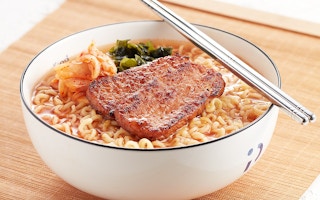Vegans can now have their luncheon meat and eat it.
To continue reading, subscribe to Eco‑Business.
There's something for everyone. We offer a range of subscription plans.
- Access our stories and receive our Insights Weekly newsletter with the free EB Member plan.
- Unlock unlimited access to our content and archive with EB Circle.
- Publish your content with EB Premium.
Two years after launching OmniPork, a vegan alternative for pork, Hong Kong-headquartered Green Monday Holdings’ OmniFoods launched OmniMeat Luncheon on Monday (18 May).
Conventional luncheon meat is typically made of pork and better known in some places as Spam, which was invented in 1937 and eaten by American soldiers during World War II. It is now a popular canned food, with about 1.1 billion cans sold worldwide in 2019, including at least 400 million cans in the Asia-Pacific, said OmniFoods, citing data from Global Info Research.
But processed meat such as bacon, ham and luncheon meat elevate the risk of colorectal cancer and medical experts have advised consuming as little processed meat as possible.
In the wake of African swine fever, which decimated the farmed pig population, pork prices also rose.
And amid reports of the spread of the Covid-19 coronavirus linked to meat facilities in the United States and some European countries, labour standards in the meat industry have also been “unexpectedly” revealed, said David Yeung, founder of the Green Monday Group.
OmniFoods—whose research and development base is in Canada—said its plant-based luncheon meat is cruelty-free, lower in fat and sodium, and does not contain nitrates and nitrites. The product is made of soy, wheat, beet and coconut oil.
From today, dishes featuring OmniMeat Luncheon will be sold at Green Monday’s Kind Kitchen in Hong Kong. From July, dishes containing the product will be available at Langham Hospitality Group’s Ming Court at Cordis, a Michelin-starred eatery in Mongkok, and Rice and Roast, a takeaway breakfast and lunch shop in Wanchai. Retail packs of the luncheon meat and OmniMeat Strips—another new plant-based product launched on Monday—will be available in Hong Kong from July.
Many plant-based meat companies are eyeing growth as the Covid-19 pandemic affects food supply chains, and many industry observers agree that health and food safety concerns could boost the popularity of such protein alternatives. Plant-based and cell-based protein generally have a much smaller environmental footprint than animal protein due to lower emissions generated, and because the feed needed to farm chickens and livestock requires much agricultural land and water.
Omnipork, which was launched in 2018, has quickly made its way into many parts of Asia including China, Thailand, Singapore and Japan. It will be found in more places such as the United Kingdom, Malaysia and Vietnam in the second half of this year, the company said.
Earlier this month, Impossible Foods launched a collaboration with restaurant and distribution partners in Singapore, allowing them to sell inventories of Impossible plant-based meat directly to their customers. This offered the partners an additional revenue source and enabled them to reduce their perishable food inventory amid partial lockdown measures in the country, which included a ban on dining in at eateries.

















